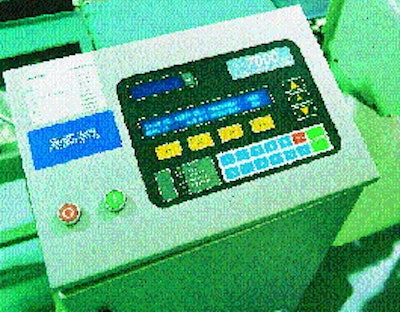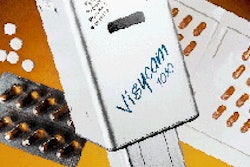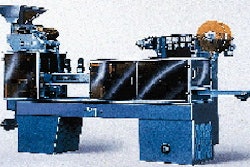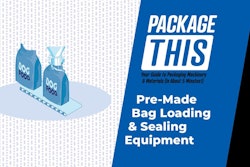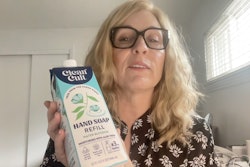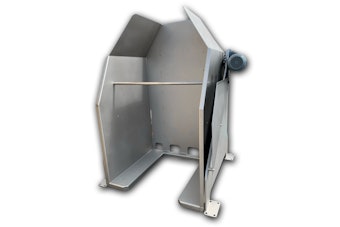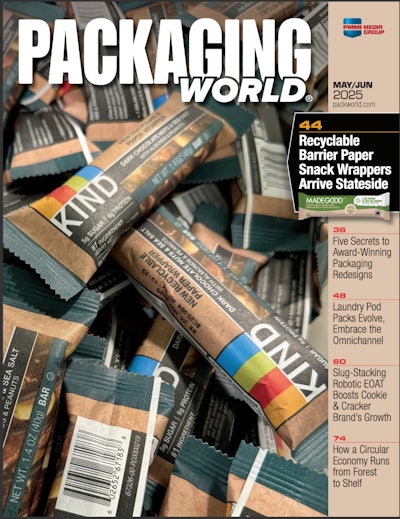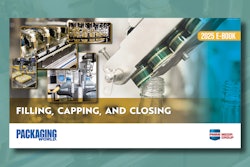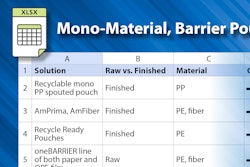Although elves are believed to be the workers producing Keebler cookies and crackers, technology helps them ensure the quality and food safety, particularly at the Macon, GA, bakery. After the plant was successful with several metal detectors from Loma Intl. (Carol Stream, IL) in the early '90s, it upgraded some of its production to the Loma Model 7000 combination checkweigher/metal detector after that model was introduced. "The combos meet the special needs of our Line Number Three," says William F. Schueler, Keebler project engineer. "It's the toughest line in the plant. We package our Chips Deluxe® and Pecan Sandies®, along with the low-fat variations of those products. "Although the Sandies are simple because they're consistent, cookie-to-cookie, the chocolate chips can vary all over the place in both size and weight. And because these cookies are sold by count rather than weight, we have to make sure that we're giving fair measure." Schueler was involved with the installation. This packaging line was already laid out, and Keebler had other weight- and metal-detecting instruments installed there. So a replacement system needed to fit. "Space was a major consideration. That's one of the reasons we went with combo units," Schueler says. "The ability [of the metal detector] to measure down to 1.5 millimeters in size was much better than the device we had been using before," he says. Trayed products Line 3 packs an average of 108ꯠ bags per shift. Products are conveyed on a thermoformed polystyrene tray through the Loma units before bagging. The powered weigh platform of the Model 7000 handles most product shapes. The metal detector is calibrated to detect metal pieces as small as 1 mm ferrous and 1.5 mm nonferrous. The Intelligent Sensitivity Control(TM) keeps the unit at optimal calibration. The sensitivity is checked each hour by quality assurance personnel who run a dummy contaminated package through to check accuracy. "We use machinery from one end of this plant to the other. Everybody that sends us materials uses machinery to package it. So there's any number of ways that metal can accidentally get into a package," Schueler points out. "We just have to be in a position to get it out before the product goes to market. "Quality is one of our big selling points, and we think we do it better than the other guys. And we have a reputation to protect. Quality is very high on our priority list, and metal is right at the top of the list in terms of something we need to watch for." Macon's plant manager, James "Bud" Petty, recalls when the more sensitive metal detector began to reject packages. "Almost all of the rejected product was caused by trace metal shavings from a grinding disk that we use in our corrugated paper recycling machine. That discovery made me feel confident we were doing our job." Minimizing giveaway "When you pack irregular products like the chocolate chip cookies," Schueler states, "the checkweighers help to ensure each package meets the legend weight without significant overweights. Our Chips Deluxe are called 'Deluxe' for a reason. Those premium ingredients are very costly." The chip cookies are automatically inserted into the trays by machines that load by count. Because the line is designed not to reject overweight packages, the statistical functions of the Model 7000 allow close monitoring and controlling of piece weights, he says. The system is easily programmable for all of Keebler's products. A common user interface for both checkweighing and metal detecting eliminates time-consuming duplicate parameters. Yet, separate reject stations isolate packages that are underweight from those that have metal contamination. The system can inspect up to 230 packs/min despite having a footprint as much as 40% smaller than stand-alone metal detectors and checkweighers. Because the unit has a 30-product memory and simple menu-driven set-up, line changeover can be completed in less than one minute. In fact, the system has data capture capabilities that are not yet being used by Keebler. "With Loma's Serial Data Link feature, we can access more quality assurance data than we're using now and communicate directly with factory systems or with MIS," says Joan Strauss of Keebler's Quality Assurance department. The durability of the Model 7000s has been proven at Macon. "We run these twenty-four hours per day, and occasionally seven days a week, so we push them hard," concludes Bill Schueler.
